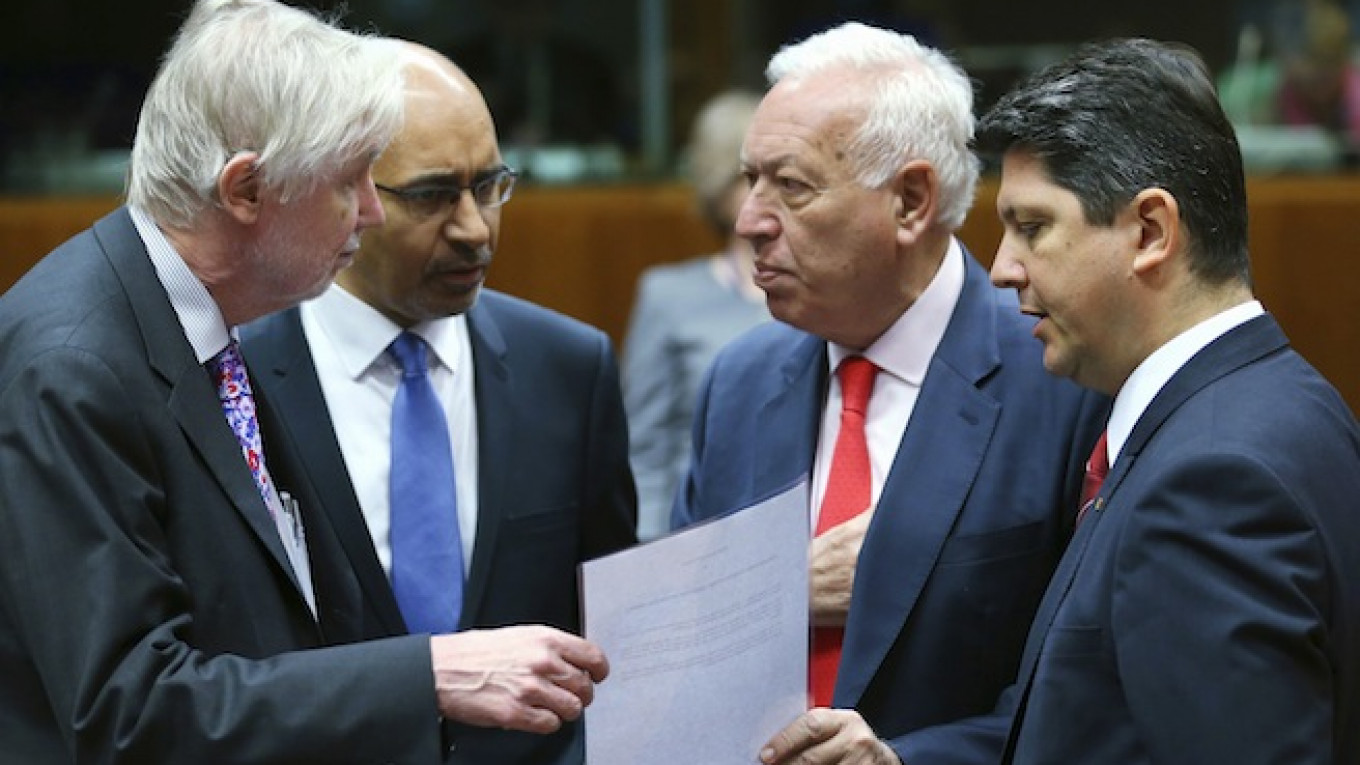The European Union agreed to impose sanctions on two Crimean companies and 13 more Russians and Ukrainians on Monday, stepping up its response to Moscow's annexation of the Ukrainian peninsula and its support for Russian-speaking separatists.
It was the first time the EU's 28 governments had taken aim at corporations rather than individuals, but the measures still fall far short of Washington's sanctions against 17 companies.
The EU was due to publish the names of the new sanctions targets later on Monday, as the decision entered into force.
The EU's reticence in imposing sanctions against Russia over its support for pro-Russian groups in Ukraine reflects concerns among many of its member states about trade and industrial ties and heavy reliance on Russian energy.
Diplomatic sources said France planned to press ahead with a 1.2 billion euro ($1.66 billion) contract to sell Mistral helicopter carriers to Russia because scrapping it would do more damage to France than to Russia.
The ministers meeting in Brussels did, however, discuss possible triggers for tougher sanctions, with big EU powers Germany, France and Britain all suggesting that Russia must be punished if it undermined Ukraine's presidential election on May 25.
A joint statement after the meeting said the EU would "pay particular attention to all parties' attitude and behavior towards the holding of free and fair presidential elections when deciding about possible future measures".
The ministers also met Didier Burkhalter, head of the Organization for Security and Cooperation in Europe, who has drawn up a peace plan for Ukraine.
"We have decided to adopt a new list of people subject to sanctions as well as entities that have benefited from the illegal annexation of Crimea," French European Affairs Minister Harlem Desir said on the sidelines of the meeting.
"This decision has confirmed the EU's great determination to make sure the territorial integrity and sovereignty of Ukraine is respected."
Referendums Criticized
As they arrived for the talks, several ministers denounced as illegal Sunday's separatist referendums organized by pro-Russian rebels in eastern Ukraine.
"These attempts at referendums have zero credibility in the eyes of the world, they are illegal by anybody's standards," British Foreign Secretary William Hague told reporters.
The EU ministers were also expected to endorse a broadening of the legal rules for sanctions on Russia, making it easier to freeze the assets of companies involved in the Ukraine crisis.
For now, the scope of new sanctions remains limited to firms or other organizations linked to Russia's annexation of Crimea, and the EU will not target high-profile firms such as the Russian energy giant Gazprom.
The EU has previously imposed asset freezes and visa bans on 48 Russians and Ukrainians over the annexation of Crimea.
Chancellor Angela Merkel and President Francois Hollande said Saturday that Germany and France were ready to agree more extensive sanctions against Russia if it obstructed the May 25 election.
Hague took a similar line on Monday, saying Britain wanted the EU to intensify preparations for sanctions "if the circumstances require it, particularly determined by the Russian attitude to the elections on May 25".
German Foreign Minister Frank-Walter Steinmeier said he would travel to Kiev on Tuesday and possibly to eastern and southern Ukraine to try to convince people there that building bridges between different sides was the only solution.
"We have to be prepared for what to do if someone prevents the elections on May 25. It that is going to happen ... then we have to think about further sanctions," he said.
But Austria's Sebastian Kurz opposed tougher sanctions.
"We should not yearn for economic sanctions as they would not only hit Russia but also definitely hit us ... If we went a step further with our sanctions with every provocation, we would already have war," he said.
Some EU governments fear that trade sanctions against Russia could undermine their own economies, just recovering from the financial crisis, and provoke Russian retaliation. Among those most reluctant to intensify sanctions are Italy, Greece, Cyprus, Bulgaria, Luxembourg and Spain.
See also:
A Message from The Moscow Times:
Dear readers,
We are facing unprecedented challenges. Russia's Prosecutor General's Office has designated The Moscow Times as an "undesirable" organization, criminalizing our work and putting our staff at risk of prosecution. This follows our earlier unjust labeling as a "foreign agent."
These actions are direct attempts to silence independent journalism in Russia. The authorities claim our work "discredits the decisions of the Russian leadership." We see things differently: we strive to provide accurate, unbiased reporting on Russia.
We, the journalists of The Moscow Times, refuse to be silenced. But to continue our work, we need your help.
Your support, no matter how small, makes a world of difference. If you can, please support us monthly starting from just $2. It's quick to set up, and every contribution makes a significant impact.
By supporting The Moscow Times, you're defending open, independent journalism in the face of repression. Thank you for standing with us.
Remind me later.






